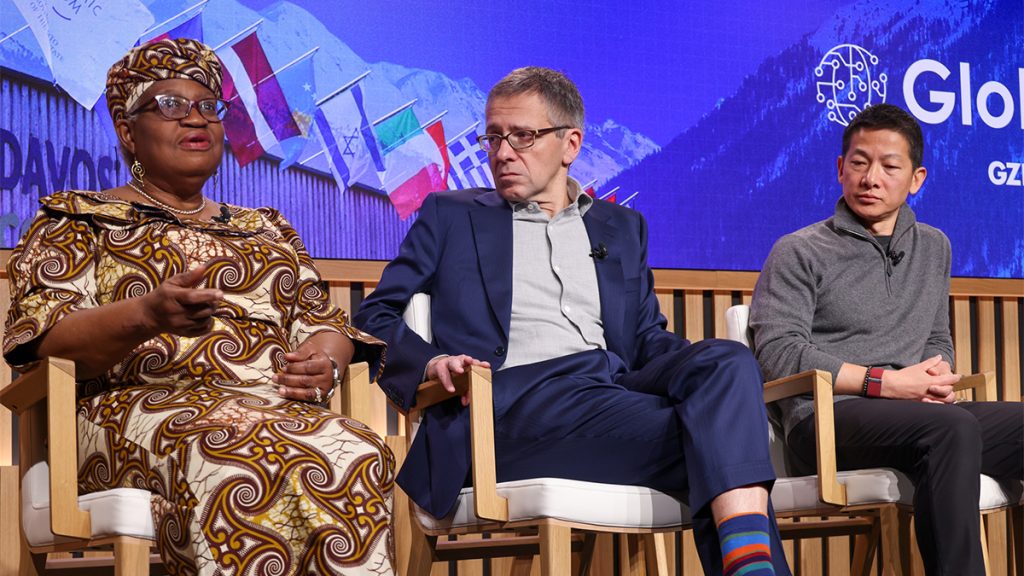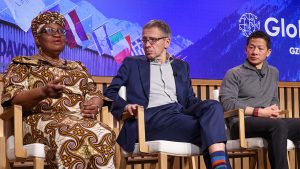
Davos: DG suggests deep breaths and to “chill” over trade tensions; ministers show WTO support

Director-General Ngozi Okonjo-Iweala invited world leaders, government officials, and businesspeople to “just chill” and “take a deep breath” amid rising trade policy uncertainties during her participation in the World Economic Forum Annual Meeting in Davos, Switzerland, from 21 to 24 January. She also attended an informal ministerial gathering on WTO issues, hosted by the Swiss government at the end of the week, during which ministers displayed “strong support for the WTO and the rules-based trading system”.
The WEF’s annual meeting was held under the theme “Collaboration for the Intelligent Age”. In her speaking engagements and interactions with heads of state, government officials and business leaders, DG Okonjo-Iweala highlighted the importance of the WTO for the world economy and for addressing current global challenges. She also underlined the risks of further economic fragmentation and the trade opportunities arising from advancements in artificial intelligence and the green economy. In addition, she warned against escalating trade tensions, which could potentially trigger a damaging trade war.

At an event on 21 January titled Finding Growth in Uncertain Times, she stated that trade has remained resilient despite recent crises, emphasizing that “trade will still be a source of growth.” She highlighted findings from a recent WTO study indicating the potential for double-digit trade growth if artificial intelligence tools are adopted, as they can reduce trade costs and boost productivity. DG Okonjo-Iweala also underscored the WTO’s relevance beyond the issue of tariffs, noting its role in ensuring food and product safety standards for imported goods. She cautioned against the risks of further trade fragmentation: “We’ve done simulations that show that fragmenting into two geopolitical trading blocs and adding trade policy uncertainty may lead to a real loss in global GDP in the longer term of 6.4%. This is like losing the economy of Japan and Korea combined.”
DG Okonjo-Iweala discussed the role of trade in environmental preservation at the session Squaring the Climate-Trade Circle on 22 January. “You can’t have the adoption of clean energy technology without trade,” she said. She also proposed that countries produce and export goods in line with their environmental comparative advantage, or the products causing the least damage in terms of carbon emissions.
On 23 January, DG Okonjo-Iweala took part in a townhall titled Debating Tariffs alongside Valdis Dombrovskis, European Commissioner for Economy and Productivity. “It is easy to use tariffs, it is attractive as a policy tool, but I hope we have a strong analysis of what this means,” she said. When asked about potential new tariffs being discussed in the United States, the Director-General warned against a spiral of retaliation that could impact the global economy, as observed in the 1930s when raising tariffs worsened the economic crisis. “If we have tit-for-tat retaliation and we go to where we were in the 1930s, we are going to see double-digit global GDP losses. That’s catastrophic. Everyone will pay, and the poor countries will pay even more,” she stressed.
On 24 January, the Director-General attended a ministerial gathering on WTO issues at the invitation of Guy Parmelin, Swiss Federal Councillor and head of the Department of Economic Affairs, Education and Research. Ministers considered the way ahead for the Organization and initial plans for the 14th WTO Ministerial Conference, to be held in March 2026 in Yaoundé, Cameroon.
DG Okonjo-Iweala encouraged members to move away from “business as usual” and long-held positions. She invited them instead to advance work on the organization’s reform. “The context is changing, we must deliver, and we must modernize,” she said. According to the summary of the meeting shared by Mr Parmelin, ministers “underlined the significance of the WTO and the rules-based, transparent and predictable multilateral trading system”.



